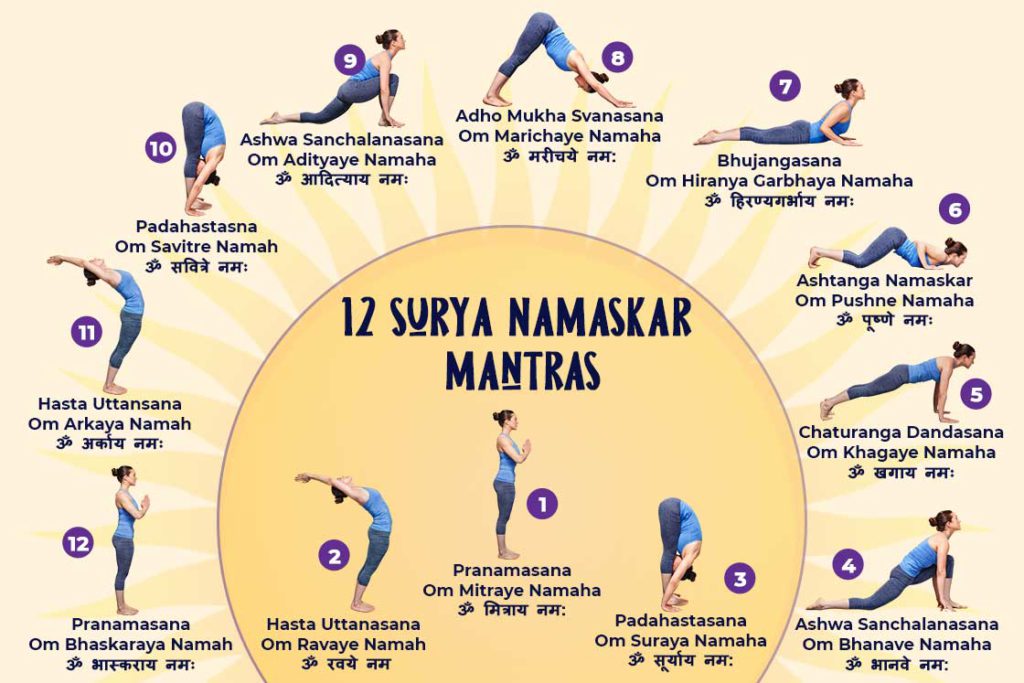
The 12 Surya Namaskar Mantras, also known as Sun Salutation chants, are a key spiritual component of Surya Namaskar. These mantras allow practitioners to honor and absorb the qualities of the Sun, deepening the connection to this ancient practice.
Each of the 12 mantras is chanted in harmony with the corresponding Surya Namaskar posture, synchronized with the breath in a meditative flow. Through these chants, the Sun is revered in its various forms and names, enhancing the spiritual essence of the practice..
Significance of Surya Namaskar Mantras
Similar to the particular sequence of 12 poses of Surya namaskar, the mantras are also chanted in a specific manner. In eastern astrology, these 12 mantras are considered the sounds of zodiac signs through which the sun passes every year in 12 phases (rashi). Chanting these mantras enhances the spiritual component of Surya Namaskar.
12 Surya Namaskar Mantras are chanted in Sanskrit. The middle term of each mantra (between Om and Namah) is one name of the Sun God. Every sound syllable of the Sun God name contained the vehicle of basic energy represented by the sun itself.
Also Read: The Mythology Behind Surya Namaskar
Chanting Sanskrit mantras could be daunting at the beginning. However, to express the true dedication to the practice its translation would come in handy.
Surya Namaskar Mantra With Meaning and 12 Postures
Below meaning of 12 surya namaskar mantras are described with posture and their correct interpretation.
Use this practice guide for understanding the essence of the Sun and the significance of paying gratitude to this powerful source of life.
1. Pranamasana (Prayer pose)
Mantra – “Om Mitraye Namaha”
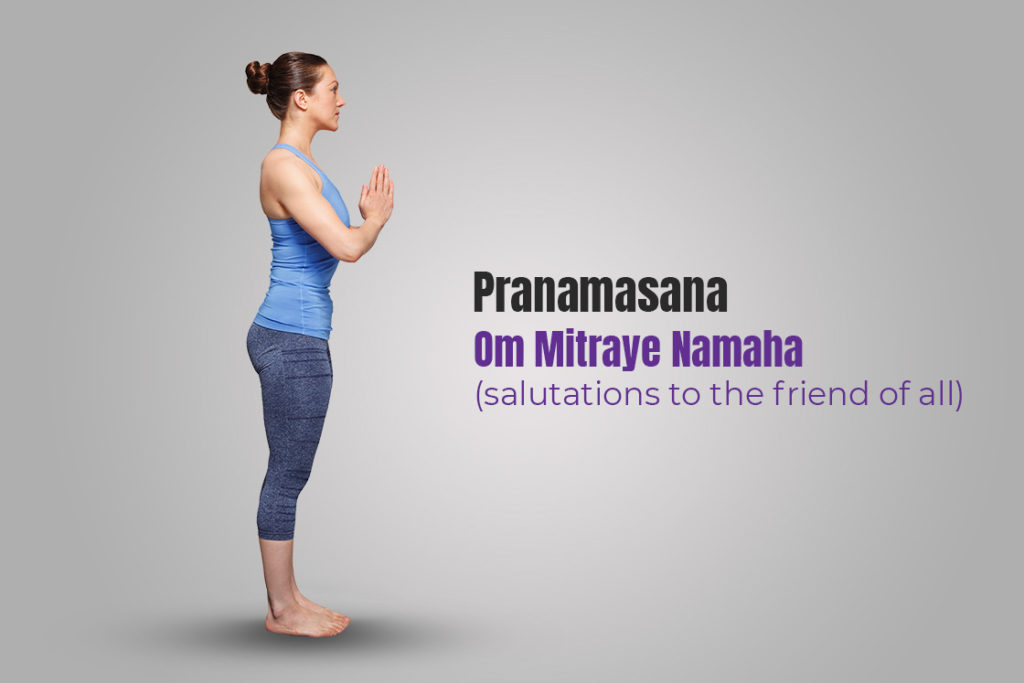
Meaning: “Mitraye” is a Sanskrit term derived from the root term “Mitra” referring to “friend.” Therefore, the first mantra of surya namaskar literally translates, “salutations to the friend of all.”
Inference: Sun is the universal entity and shares its light equally amongst all without any discriminations which symbolizes friendship. Hence, in pranamasana, we praise the Sun for being the ultimate source of life for every organism on Earth like a true friend.
2. Hasta Uttanasana (Raised arms pose)
Mantra – “Om Ravaye Namah”
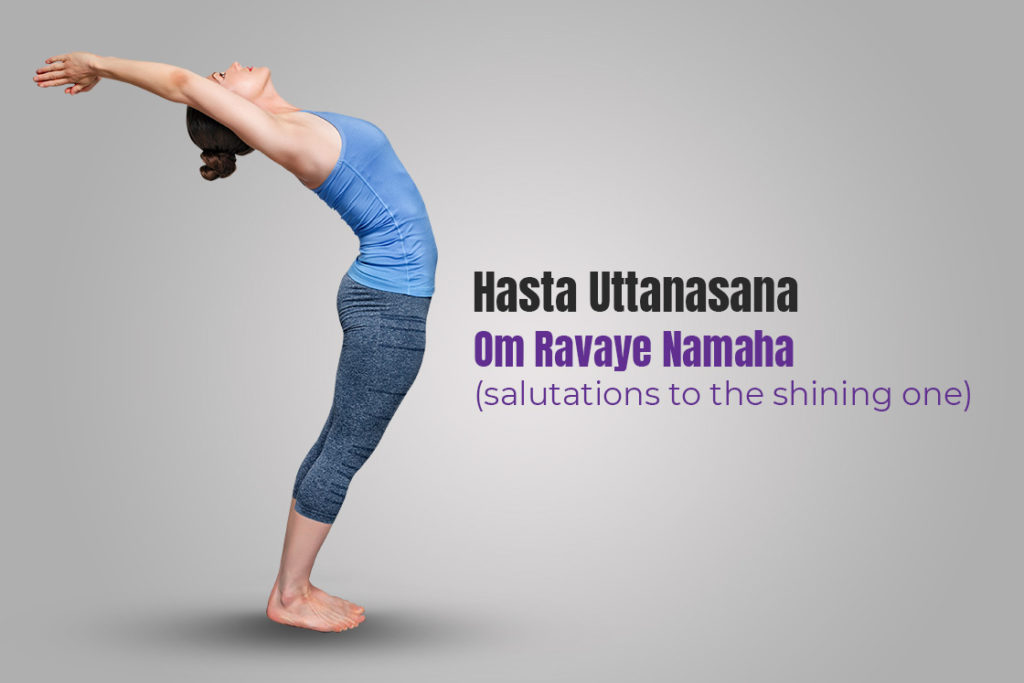
Meaning: In this pose, Sun is being called on by its Hindi synonym, “Ravi”, which means “shiny”. Hence, the mantra is translated as, “salutations to the shinning and radiant one”
Inference: “Ravaye” denotes something that shines and offers blessings on all. In the second pose of sun salutation, the entire body is stretched and opened up receiving the strength and energy from the Sun and also to greet it for sharing its radiance.
3. Padahastasana (Standing forward bend)
Mantra – “Om Suraya Namaha”
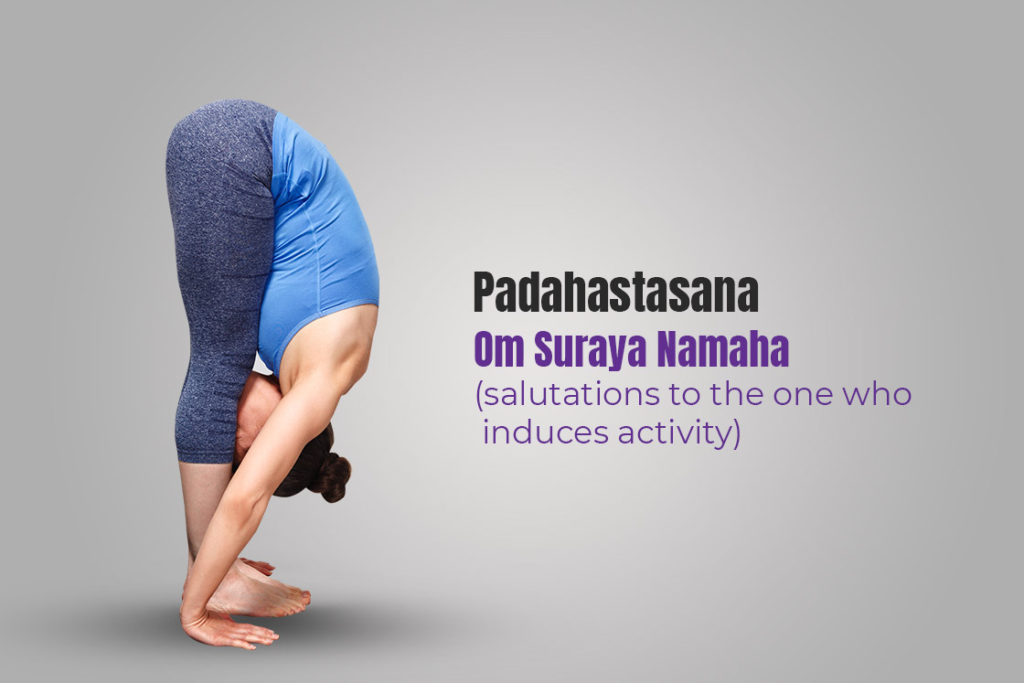
Meaning: “Suraya” has been derived from Surya which is the name given to the Sun to be praised as a Hindu God who is responsible for moving the day and life on Earth. Thus, “Om Suraya Namaha” means, “salutations to he, who induces activity.”
Inference: The Sun is the dynamic being that energizes the Earth, humans, and all the living beings. Therefore, folding forward in Padahastasana and chanting the corresponding Surya Namaskar mantra connects us to the Earth for sharing the common source of energy. It also develops groundedness and balance for equally sharing the energizing properties from the Sun.
4. Ashwa sanchalanasana (Equestrian pose)
Mantra – “Om Bhanave Namaha“
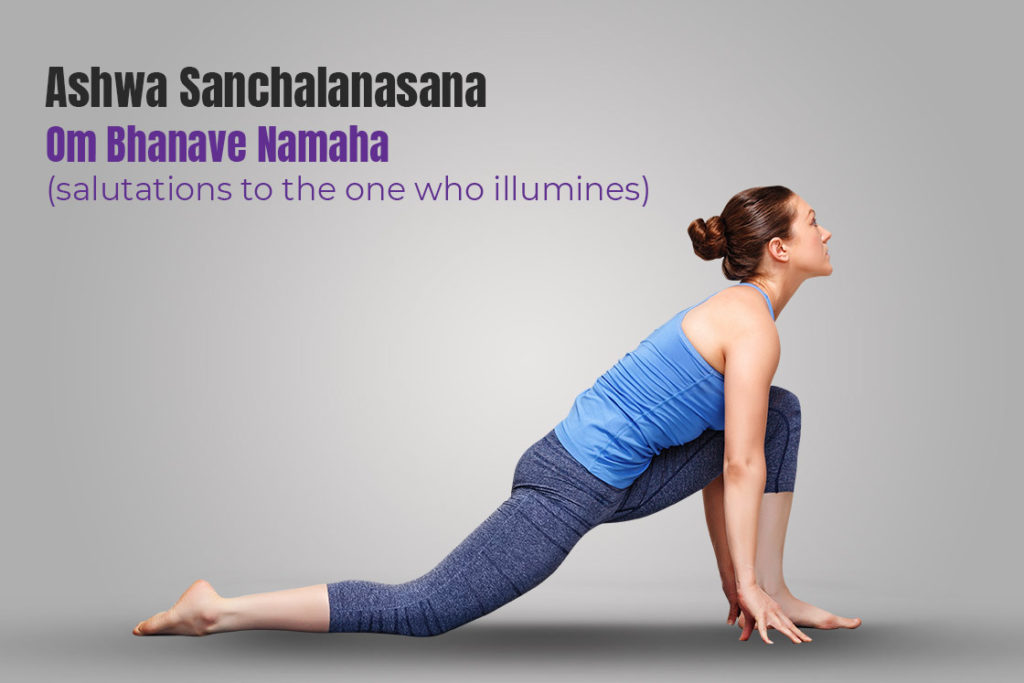
Meaning: “Bhanave” is again derived from the Hindi synonym of the Sun, “Bhanu”. It means the one which serves as the source of light. This translates the mantra as, “salutations to he, who illumines.”
Inference: The Sun is considered as a dispeller of darkness by bringing in the daylight every day. Therefore, this surya namaskar mantra is chanted while looking upward in Ashwa Sanchalanasana. Keeping the head and gaze up in this pose signifies the removal of mental blocks, fears, negativity, and overcoming the limitations.
5. Chaturanga Dandasana (four-limbed staff pose)
Mantra – “Om Khagaye Namaha”
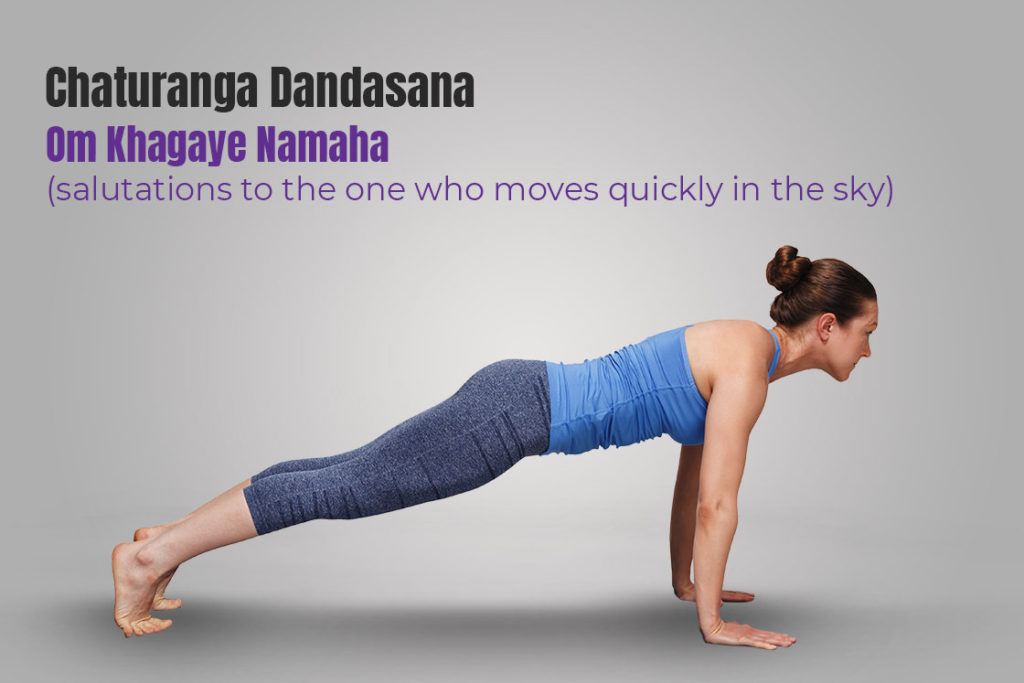
Meaning: “Khag” is a Hindi term that refers to the one who resides in the sky. Therefore, here it addresses the Sun due to its moving position in the sky throughout the daily hours. Thus, the shloka translates, “salutations to he who moves quickly in the sky.”
Inference: Passage of the Sun is considered as a traditional clock for the people in ancient times. Therefore, chanting this mantra in the fifth position the practitioner becomes a conduit with the earth and the sky requesting the passing of time with respect to the Sun to be kind to all.
6. Ashtanga Namaskar (eight-limbed pose)
Mantra – “Om Pushne Namaha”

Meaning: The term “Pushne” is derived from the term “Poshan” which means “nourishment”. This Surya Namaskar Mantra is chanted to praise the Sun for being the giver of nourishment to the living beings. It is better understood as paying salutations to the giver of strength and nourishment.
Inference: While performing Ashtanga Namaskar we seek the energy and nourishment from the Sun so that it enhances our strength on a deeper level.
7. Bhujangasana – (cobra pose)
Mantra – “Om Hiranya Garbhaya Namaha”
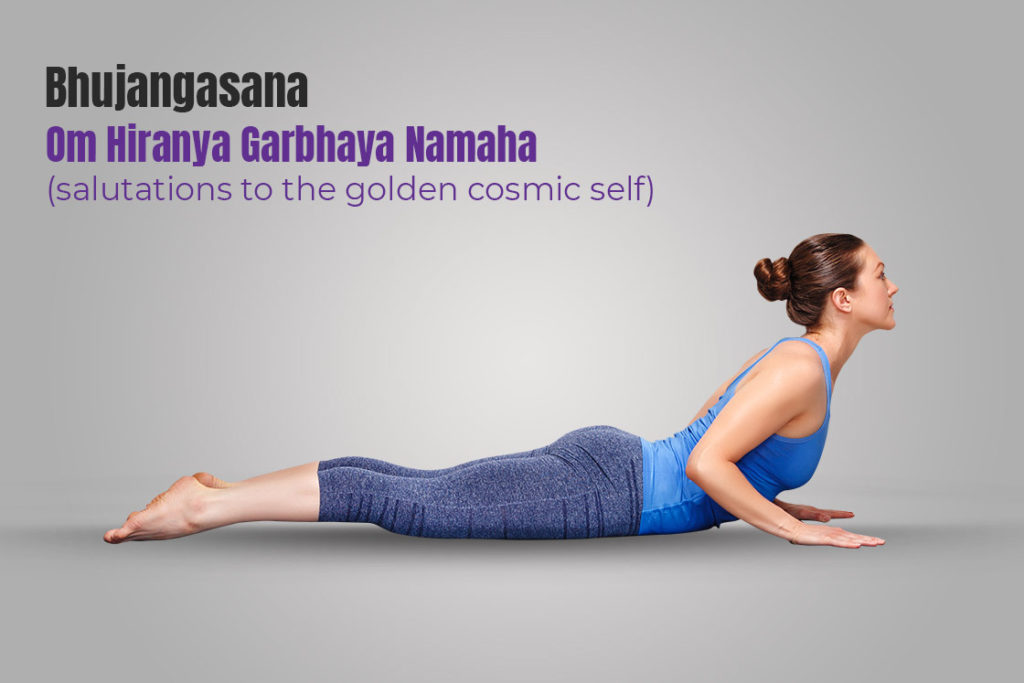
Meaning: “Hirangarbh” is a composite term having formed by combining “Hiran” (deer) and “Garbha” (womb). The deer womb is also considered as the starting of life in the Universe. It is also known as the golden egg since the Sun is the golden cosmic body, hence, this mantra refers, “salutations to the golden, cosmic-self.
Inference: Hiranya Garbhaya is also known as the golden egg and the manifestation of self-existence. Sun is considered as the God that has the golden brilliance that can manifest life. Hence, this mantra while practicing Bhujangasana expresses the requesting gesture to fill life with creativity.
8. Adho Mukha Svanasana (Downward dog pose)
Mantra – “Om Marichaye Namaha”
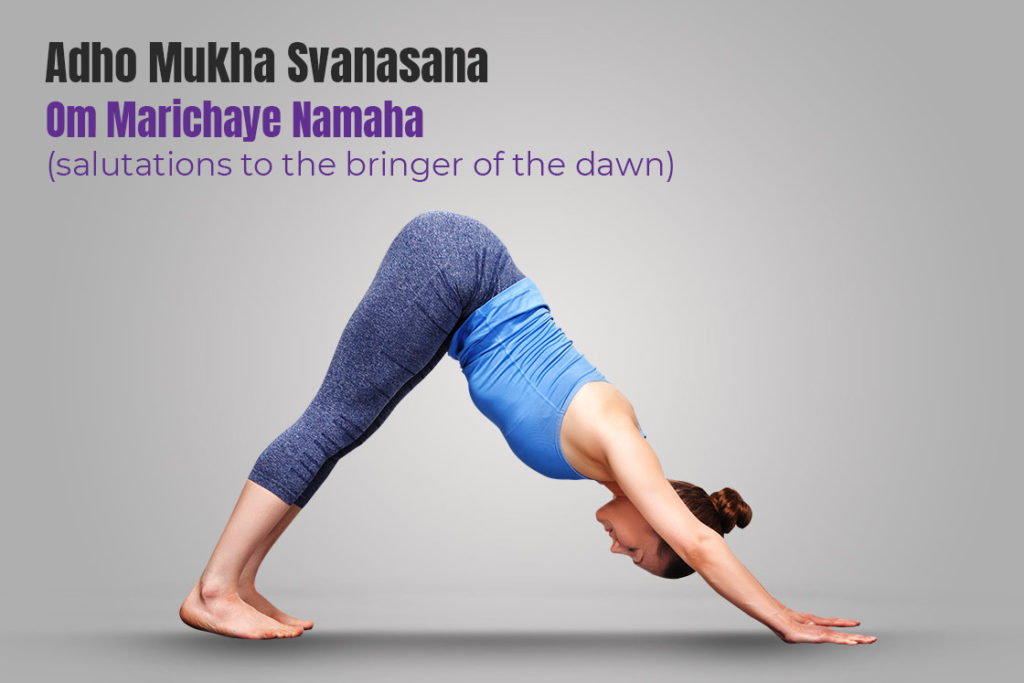
Meaning: “Marich” is another synonym of Sun that means “rays of light”. Since Sun brings forth dawn Thus, this mantra has a translation that conveys salutations to the Lord of the Dawn.
Inference: Besides praising the Sun, the term Marichaye also refers to a mirage that serves as an illusion or distraction. They create hurdles in the path of life, therefore chanting this in the eighth pose is for seeking the true path or purpose in life. It inculcates the true wisdom to discriminate between what is real from unreal.
9. Ashwa Sanchalanasana (Equestrian pose)
Mantra – “Om Adityaye Namaha”
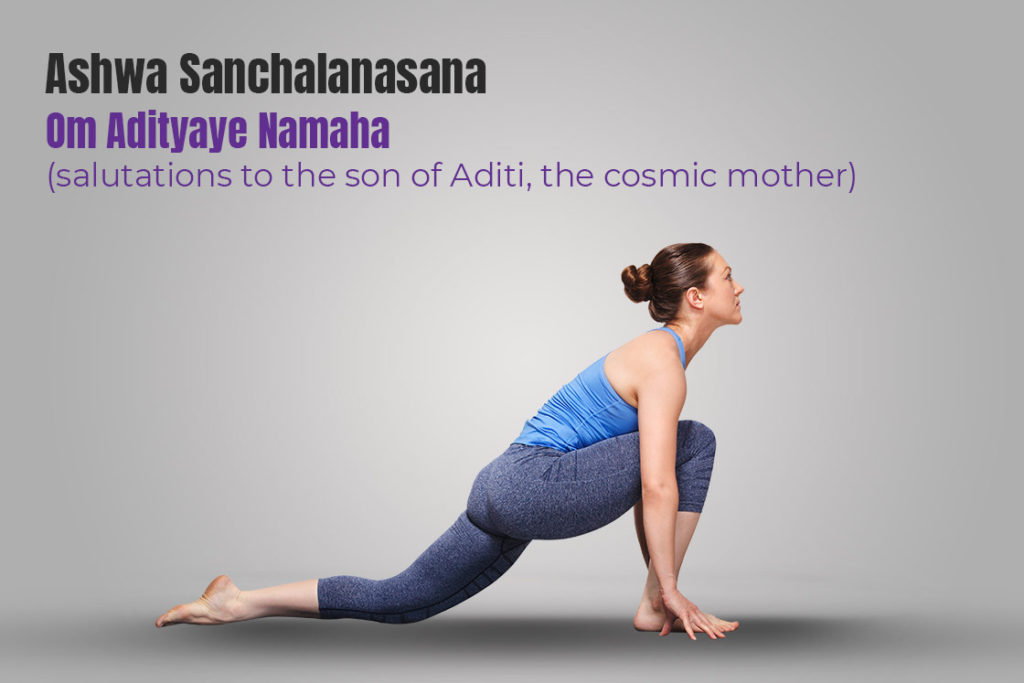
Meaning: Aditya is the son of the universal mother, Aditi. In this surya namaskar mantra we are praising Sun as the son of cosmic mother. It literally translated as greetings to son of Aditi, the cosmic mother.
Inference: Everything on the Earth has been originated or created by the cosmic mother, Hence in this ninth position, along with worshipping the Sun the practitioner also greets the creative power that we are a part of and that flows through all life.
10. Padahastasna (Standing forward bend)
Mantra – “Om Savitre Namah”
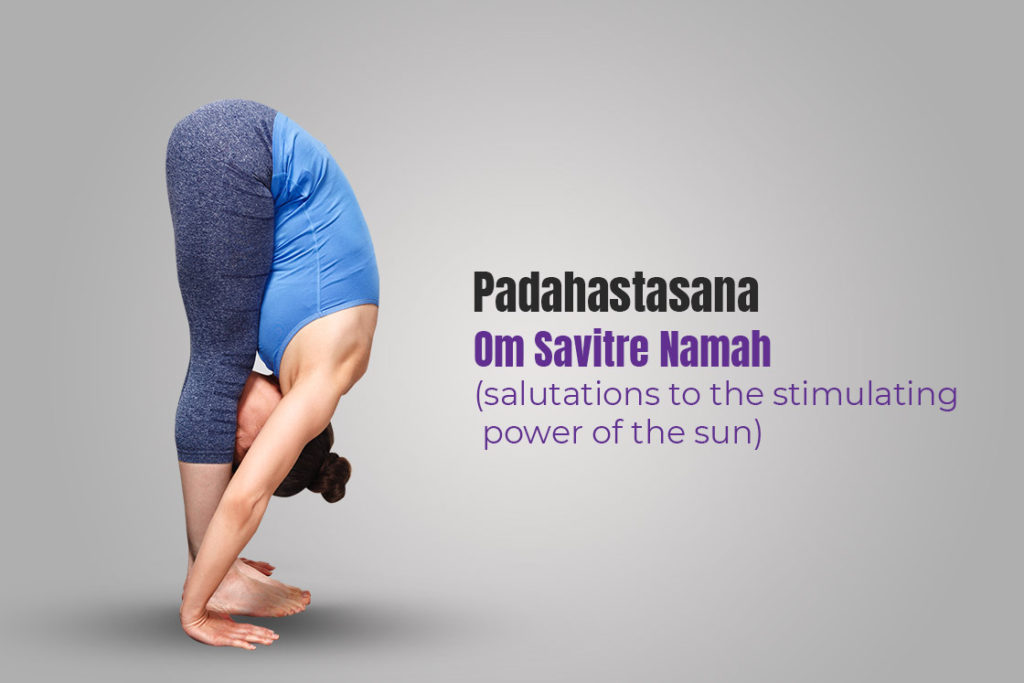
The Sun shows two of its state throughout the daily hours, the sunrise and sunset. Before the time of sunrise, it is known as “Savitr” in Hindi or Sanskrit. Hence, “Om Savitre Namah” expresses salutations to the lord of creation or the one who enlightens the world.
Inference: Savitre is a term that refers to the stimulator or energizer. Therefore, in the tenth position, we bow down to receive the stimulating or creative energy that aids in achieving the desires with kindness and love.
11. Hasta uttansana (Raised arms pose)
Mantra – “Om Arkaya Namah”
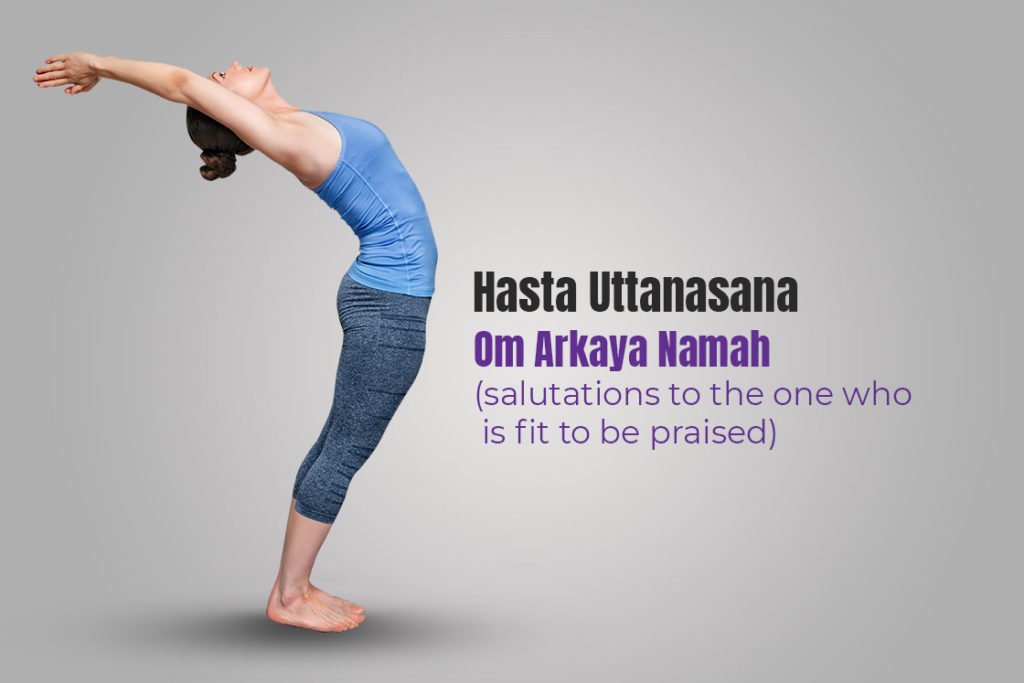
The term “Arkaya” here has been taken from “Ark” which denotes something which is worship-able. Hence it is traslated as, salutations to he who is fit to be praised.
Inference: In this posture the arms and entire self is stretched to the sky. By stretching and opening up towards the sky, the practitioners greet the Sun as well as the sky to receive energy and to express gratitude to the great force in the sky.
12. Pranamasana (Prayer pose)
Mantra – “Om Bhaskaraya Namah”
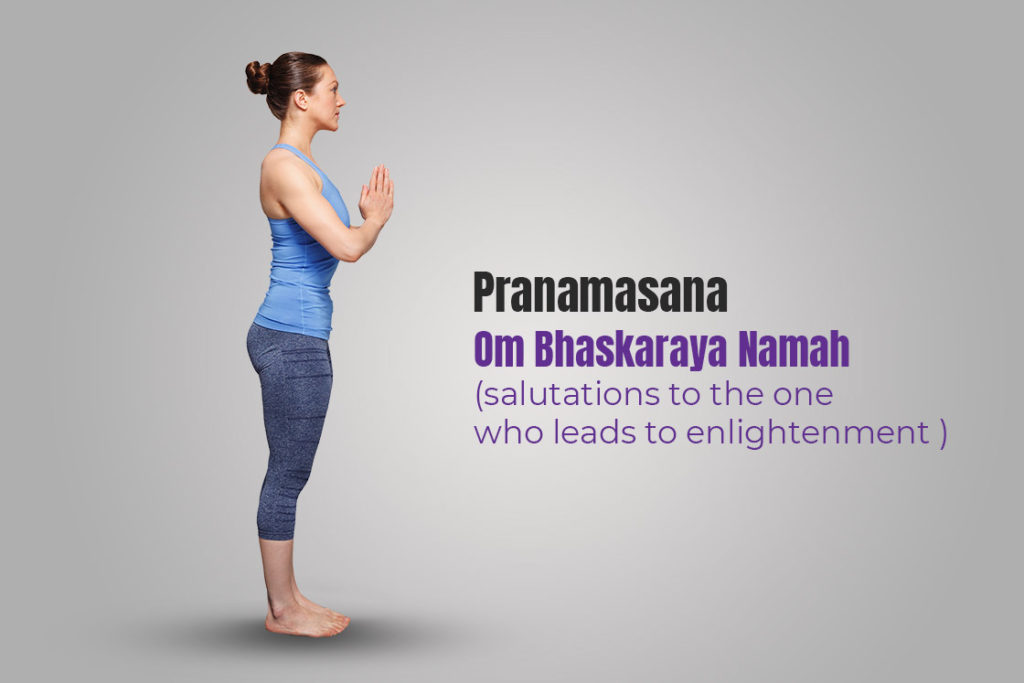
“Bhaskar” is a composite term having “Bha” that means “light and knowledge” while “Kar” refers to “do”. It signifies the Sun as the one who brings light and knowledge to the practitioners. It is translated as salutations to he who leads to enlightenment.
Inference: This surya namaskar mantra brings you closer to enlightenment by developing a harmonious connection. Due to this, Surya namaskar is considered as a complete spiritual practice, i.e. Sadhana.
Bija Mantra for Surya Namaskar
If you would like to practice Surya Namaskar at a fast pace and 12 Surya namaskar mantras are too much to incorporate, then Beej Mantras are all you need.
There are six Beej Mantras aka seed syllables that are repeated consecutively four times in the following sequence throughout the practice.
- Om Hraam
- Om Hreem
- Om Hroom
- Om Hraim
- Om Hraum
- Om Hrah
There is no particular meaning of these Beej mantras, however, these bring forth powerful vibrations of energy within the mind and body of the practitioner.
Conclusion
Uplift your traditional Surya Namaskar practice by incorporating these 12 Surya Namaskar mantras with the 12 poses. These mantras enhance the mindfulness while chanting and brings total awareness within the practitioner.
Chanting loudly or in the mind is totally the choice of the practitioner, however, the benefits will remain the same. Therefore, achieve the full form of Sun salutation and reap all the benefits of combining mantras to your practice.

